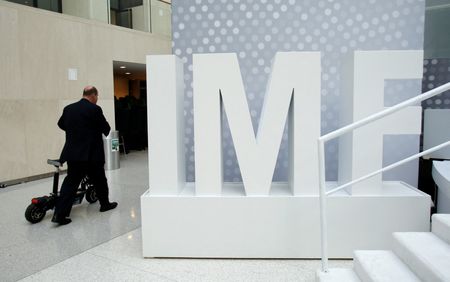By Andrea Shalal
(Reuters) -The International Monetary Fund on Tuesday warned that any loss of central bank independence could undermine efforts to keep inflation expectations in check, potentially triggering a wave of financial, monetary and macroeconomic instability.
The IMF hammered home that message in an update to its World Economic Outlook, released Tuesday, and in a separate interview with IMF chief economist Pierre-Olivier Gourinchas.
In the update, the IMF said the current economic climate of prolonged trade tensions and uncertainty over evolving tariffs heightened the need for robust policies to safeguard financial stability and ensure central bank independence.
In some cases, if tariff shocks resulted in disruptive movements in foreign exchange and risk premiums, it said it might be suitable for countries to implement temporary foreign exchange interventions or capital flow management measures.
“Crucially, the ambiguous and volatile landscape also requires clear and consistent messaging from central banks and the protection of central bank independence, not only in legal terms, but also in practice,” the global lender said.
U.S. President Donald Trump has repeatedly exhorted the U.S. Federal Reserve to cut interest rates while questioning the leadership and continued tenure of Chair Jerome Powell, whose term at the Fed’s helm is due to end in May 2026.
Those statements have unsettled markets, worried about a loss of the longstanding principle of Fed independence.
The two men sparred over cost overruns on a Fed renovation project on Friday, as Trump repeated his call for lower rates.
Asked about Trump’s efforts to push Powell out of office, Gourinchas underscored the importance of maintaining central bank independence to keep inflation expectations anchored.
“This is really a core plank for macroeconomic stability overall. That’s one of the hard learned lessons of the last 40 years,” the IMF chief economist told Reuters in an interview, without mentioning the Fed specifically.
“We have a very, very clear message on this – it’s very important to keep central bank independence and to implement it,” he said.
Central bank independence was foundational to macroeconomic frameworks in both advanced and emerging economies, he said.
Despite the recent era of large price increases from 2021 to 2024, markets and consumers maintained confidence in policymakers’ determination to keep inflation in check over the medium term, averting a broad de-anchoring of inflation expectations.
“They think that someone is at the helm, someone is in the driving seat and is going to implement monetary policy to achieve price stability,” he said. “That’s the credibility.”
Should that credibility become called into question or threatened, the link from inflation to inflation expectations would become “much more brittle,” he said.
Inflation could rise again suddenly due to myriad shocks, and if people did not trust central banks to do their jobs, inflation expectations would start rising, triggering wage increases, which would beget higher prices, higher interest rates and ultimately a need to “crash the economy.”
“So now you have macroeconomic instability. You have monetary instability and you have financial instability,” he said, underscoring the need to ensure consumers and financial markets were certain that central banks would act on their own.
(Reporting by Andrea Shalal, Editing by Nick Zieminski)







